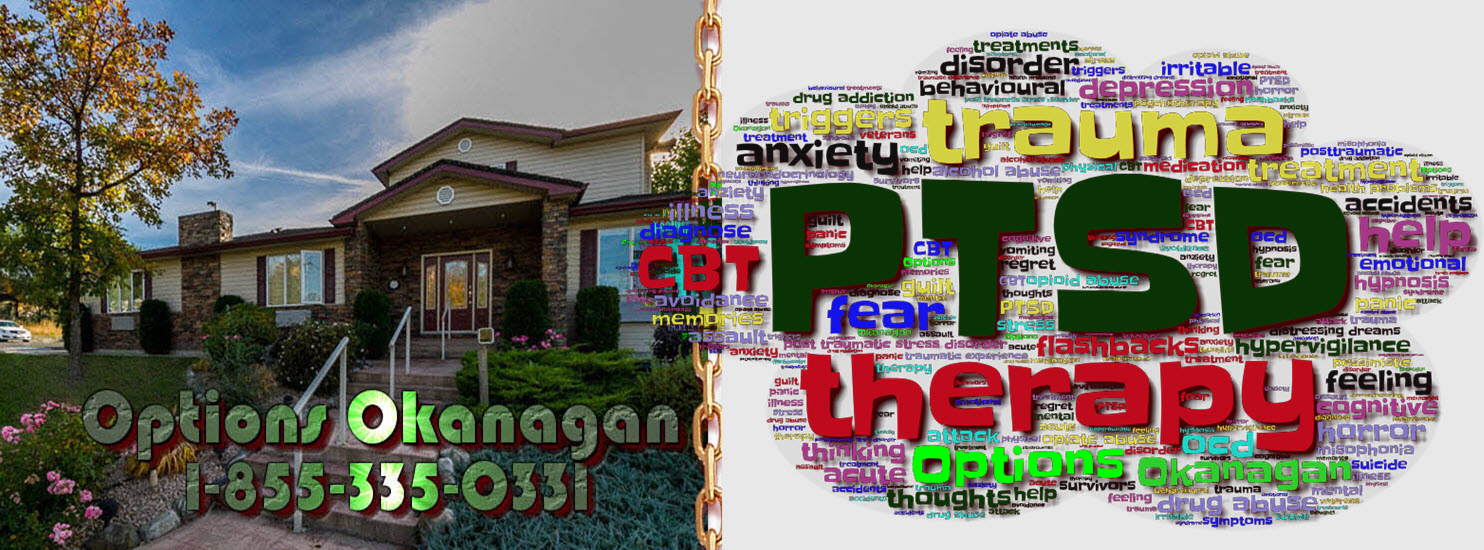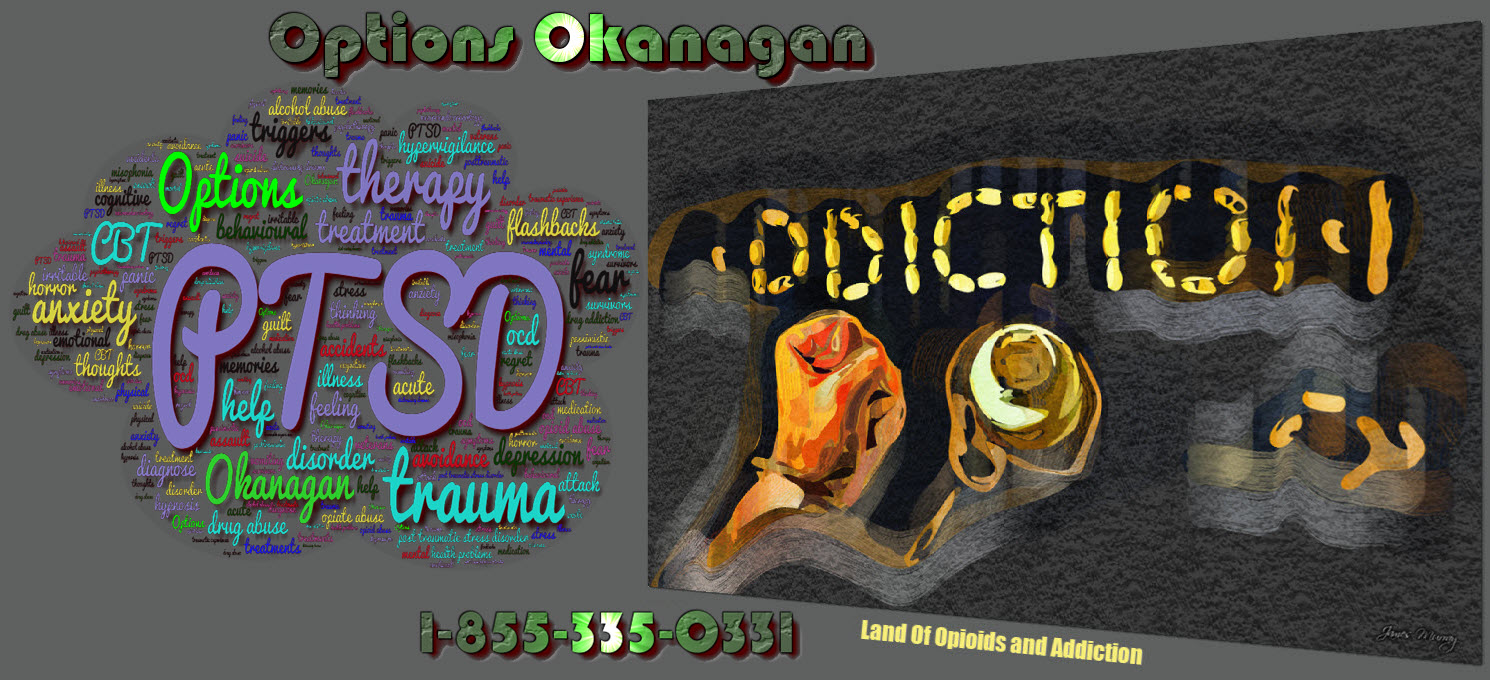Post-traumatic stress disorder (PTSD) – Mental health disorder programs – Opiate and prescription drug rehabilitation programs in British Columbia and Alberta – Options Treatment Center in Kelowna, British Columbia treating prescription drug, opiate, fentanyl, heroin, and alcohol addiction and recovery.
Prescription Drug Rehabs In Alberta And BC
Post-traumatic stress disorders (PTSD) and this disorder affect more than just veterans.
Recently, PTSD has attracted hundreds of hours of news media attention regarding the return of military personnel from the war zones. PTSD arises from a terrible experience where someone is in direct danger of physical injury or has actually suffered physical damage. Regrettably, most individuals who suffer from traumatic events will manage to overcome the emotions and turbulence of the event, but for numerous people, the emotional environment of the event develops in the PTSD field, which can be identified by the various signs and symptoms identified in the fifth edition identified as diagnostic and statistics guide for Mental Health Disorders (DSM V).
Although the issues around this disorder continue to be a major problem for the Department of Veterans Affairs, it affects millions of people in Canada, the United States, and throughout the world. According to the National Mental Illness Alliance, 10% of men and 5% of women will experience PTSD at some point in their lives. However, women are twice as likely to develop PTSD than men, according to the American Association for Anxiety and Depression. Unknown to many people, PTSD can affect children and is often associated with other mental disorders.
PTSD can be further analyzed by examining how various factors cause the disorder, what PTSD tests are available, and what treatment options are available. Although many individuals are aware of this disorder, few spend time studying their nature, which can affect anyone, and even without realizing its happening.
Mental Health Disorder Programs In Alberta And BC
Signs of PTSD
PTSD signs are a direct result of the ultimate fear given to an individual who has a traumatic experience. Because the signs and symptoms of PTSD are very similar, it is best to categorize the symptoms that make up the three common signs of PTSD. The signs of PTSD in a person are a lasting fixation of the event, event avoidance, or excessive vigilance for non-threatening circumstances or experiences. An individual with PTSD will react in sudden noises or behave abnormally in different situations. In addition, an individual with PTSD may be more susceptible to problems with drug or alcohol abuse, including illegal and legal opioids, according to the Department of Veterans Affairs.
The symptoms of PTSD
According to the National Institute of Mental Health, PTSD symptoms are divided into three main features of PTSD: relapse symptoms, avoidance symptoms, and hyperarousal symptoms
Reliving symptoms of PTSD
The symptoms of PTSD recurrence are often the most serious because they force PTSD patients to relive their experiences in their heads. This may involve the same physiological responses as to their first traumatic event, such as their heart rates will increase, start rapid breathing, and begin to sweat. An individual will go through experiences of bad dreams or scary thoughts about the event. These symptoms affect an individual’s ability to perform adequately in everyday life when their mind places these events in the foreground of their headspace.
Symptoms of avoidance
During avoidance symptoms, an individual usually avoids anything that reminds them of a traumatic event. This might consist of moving away from the place, event, or objects associated with the event, feeling really numb, feeling guilty, depressed, or anxious, losing interest in activities that were previously enjoyed, and having difficulty dealing with a traumatic event remembering the event. Because these symptoms can reflect the symptoms of clinical depression, it may be difficult to distinguish these symptoms from individuals suffering from clinical depression. But, because of the existence of a traumatic event and the period of time in which it occurred can help identify PTSD or clinical depression.
These symptoms affect the routine of individuals who suffer from this mental disorder, especially those who suffer from PTSD because of their active military service. This can also be observed in individuals driving who experience a traumatic accident, and if they lose confidence in their driving abilities or have problems getting into vehicles again.
Symptoms of Hyperarousal
Hyperarousal symptoms of PTSD can be one of the most difficult to figure out from PTSD because they are often hidden until activated by distinct triggers or actions. An individual who is suffering from these hyperarousal symptoms can easily become afraid and jumpy, have an overwhelming feeling of anxiousness, sleeping problems, or show aggressive behaviors in certain situations.
Symptoms of Acute Stress Disorder (ASD) compared to PTSD
With all of these symptoms that characterize PTSD, numerous individuals begin manifesting these symptoms a few weeks after a traumatic event. It should also be noted that Acute Stress Disorder is very different from PTSD, and ASD leads to the same symptoms as PTSD immediately after the event. But, symptoms of acute stress disorder disappears within a couple of weeks, whereas PTSD symptoms can become more severe or more serious.
Options Okanagan Opiate and Alcohol Treatment Centers in Kelowna, Salmon Arm and Vancouver, British Columbia – Men and Women are recovering and healing from Alcohol and Drug Abuse at our treatment center here in the Okanagan right now.
Our unique and distinctive Opiate Drug and Alcohol treatment program allow men and women to come in from Calgary as well as Edmonton as we offer airport pickup.
Numerous clients come to us from Vancouver, Calgary, and Edmonton and other locations in Alberta and even other provinces for Opiate addiction treatment, heroin drug treatment, many other drugs, and alcohol addictions for rehabilitation because of the uniqueness of our treatment center.
Our (Kelowna) Alcohol and Drug Treatment Program Location:
(Not Mailing Address) – Contact Us – Web Page
For Mail Delivery :: Please contact each center for correct mailing addresses, also this location is the location of our residential treatment programs in Kelowna. Please call Toll Free 1-855-335-0331 – to contact the treatment center you are going to for the address and directions.
Options Okanagan Drug and Opiate Treatment Center
551 Sherrydale Crescent, Kelowna, British Columbia, V1V 2E6
Toll-Free Phone Number: 1-855-335-0331



 and Trauma Rehab Centers in Alberta and BC - Options Okanagan.jpg)
